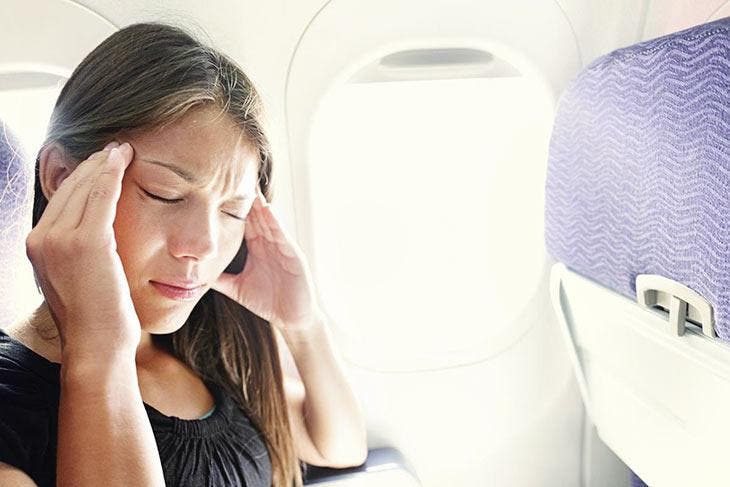
You have no choice, tomorrow you have to fly, business travel requires. In other words, you are already anxious at the idea of getting on board. As always, the day before the flight, you hardly sleep at night. It is stronger than you, you have a sickly fear that prevents you from relativizing and keeping your cool. Obviously, you are far from the only one to feel such panic. According to various studies, 30% of travelers have a blue fear of flying and nearly 50% of people feel psychological or physical discomfort, more or less important. But, do not give up, there are various ways to better understand a theft. Here are a few of them:
1. Educate yourself
We will often tell you: everything happens in the head! For most people who are afraid, it is their subconscious that cannot admit that a huge mass of metal can remain in the air without falling. So already, it would be wiser to become better acquainted with the principles of aerodynamics to understand their scope. Do not hesitate to consult a variety of tutorials on the Net that will explain in detail how certain forces act on the aircraft and how they maintain its balance in the air.
2. Do breathing exercises
This may seem absurd and futile, but think again, these exercises are a great help. As soon as you feel panic engulf, train your breathing to increase your heart rate.
Here are the steps to follow:
Another very simple exercise to perform
3. Try to distract yourself
Of course, when you are very scared on a plane, it is rare to travel very far and endure ten hours of flight, for example. With the exception of domestic flights, the duration of a short flight is usually about two hours. But, for some people, it can last forever! If this is your case, instead of feeding negative emotions, try to play the cunning card. To counterattack your anxiety, there’s nothing like multiplying distractions.
Arm yourself with two or three magazines, a book, a tablet to watch your favorite series. Are you probably travelling accompanied? So, do not hesitate to chat with this person during the flight, the conversation will capture all your attention and the time will surely seem shorter. Otherwise, and if you can of course, sleeping would also be a very good idea. Still, stress must allow you to do so!
4. Avoid bad news
Obviously, before traveling, it is certainly not a good idea to watch a movie that features a plane crash or even to see scary videos on the Internet. Moreover, as long as you do, since you are sensitive on the subject, it is always better to avoid this type of information. And, above all, do not start researching plane crashes and disasters of all kinds. We repeat it to you (even if you probably already know it!), statistically speaking, the plane is 6,000 times safer than the car, which is by far the deadliest vehicle.
Good to know : To reassure you more, know that before each flight, the aircraft is carefully checked and it prefers a complete overhaul very frequently. No need to torture your mind with negative ideas that will only fuel your panic unnecessarily. Stay calm, you are safe!
5. Take supplements for relief

Under the approval of your doctor, if it seems necessary to you, you can always take supplementsDiet to relax. In particular, relaxing drops (such as valerian root which is a natural sedative), Bach flowers or magnesium. However, psychologically speaking, it is enough to know that you have on hand supplements, in case of emergency, to already feel more confident and reassured.
6. Book an overnight flight
Many people who tremble from traveling by plane often prefer to fly at night. This seems more logical since the probability of being overwhelmed by sleep is significantly higher than during the day. Indeed, difficult to fight his usual sleep rhythm. In addition, at night it is always more calm and quiet on board. There are no rolling carts in the aisles, announcements are kept to a minimum, lights dim and most passengers are quieter. Such a gentle and serene environment will surely be more conducive to you to channel your anxiety on board.
It’s hard to explain why so many people fear flying. Is it because they feel helpless, knowing that only the pilot can control the aircraft? Could it be because of all these fantastic movies with Hollywood sauce? Finally, it can also probably be a buried trauma that stems from a bad experience on board, because of strong turbulence. Whatever the reason, the fear of flying can really ruin the start of your vacation. So, to gain serenity and better understand your flight, here are some tips that will help you relax.
1. Talk to the crew about your fear of flying

“Talk to a professional. No, not to a psychologist (although this may also help eventually), but rather to a professional of the airline, “suggests Romain Lloyd, expert in aeronautics. “From safety checks and taxiing to take-off and landing, hearing what’s happening outside the cabin will help you feel less at the mercy of complete strangers.” By familiarizing yourself with aviation jargon and empathizing with flight attendants, you’ll already feel more confident. Moreover, if you have a family member or friend who works in the field as a pilot or steward, it would be a great opportunity to learn more and listen to their experiences. Similarly, do not hesitate to share your fears with the crew so that you can be reassured. So trust the flight attendants who have had to deal with many nervous and anxious passengers. And, tell yourself that the on-board staff most certainly have a variety of tools to help you feel more comfortable.
2. Consider an aisle seat
When you are afraid on a plane, it is also important to choose a less restrictive seat so as not to feel suffocated or imprisoned. In truth, the most recommended seat would be the one in the aisle. After all, it is the one that allows you to have the freedom to move at any time, to make the hundred steps or to go to the bathroom faster. “If you’re claustrophobic, make sure you choose an aisle seat before flying,” Lloyd says. “It’s always wiser to go to an airline that allows you to choose your seat to be more comfortable and not to feel trapped. This allows you to easily get up and walk around the cabin as needed. »
3. Don’t eat just anything!
Yes, it’s all silly, but what you consume can help or worsen your flight. Golden rule: never get on a plane hungry (or too busy either!), it only accentuates the feeling of nausea. Even if fear has cut your appetite, force yourself to snack on something, such as yogurt or fruit. And also remember to hydrate well. Be careful, go soft with coffee or any other caffeinated drink, as this can increase your nervousness. Soothing teas, on the other hand, are a real treat for the nerves!
4. Think about your destination to relax
Obviously, it all depends on where you go. But if it’s an idyllic destination, and you’re looking forward to it, it’s a great way to thwart your fear and focus your thoughts on your stay. Do not hesitate to close your eyes to imagine yourself in this new country and to think about a whole tempting program. “When negative thoughts assail you, deftly deflect them by thinking about how good you’ll feel once you get there. In this magical place where you will enjoy a well-deserved and hard-earned vacation”, Lloyd suggests.
In what situations is it not advisable to fly?
Apart from fear, whether justified or not, there are of course more serious and serious cases where flying is not advised at all. Generally, these are specific diseases that prevent the person from traveling freely, at the risk of aggravating their state of health.
- All chronic diseases of the respiratory system with severe symptoms (shortness of breath even at rest), such as pneumothorax or conditions in the nose and paranasal sinuses.
- A recent heart attack or stroke.
- A possible recent surgery or an injury to the abdomen or even the brain.
- Increased intracranial pressure (e.g. due to trauma).
- Unstable coronary artery disease.
- Possible psychosis (unless you are under constant care and your doctor gives you permission to travel).





